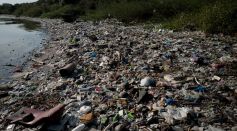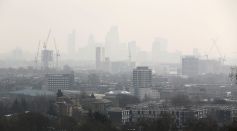Tags: Pollution

Pesticides Place 31% of Global Agricultural Land at Risk, Study Says

Bottlenose Dolphins Adjust to Pollution, Enduring Intrusive Coastal Constructions

One in Five People Die from Fossil Fuel Air Pollution

Rare Metals Found in Toys and Food Packaging, Is it Due to Plastic Recycling?

Chemist Explains How Oil is Turned into Plastic
South Asia's Worsening Air Pollution Is Causing Pregnancy Loss, Study

Plastics Are Now Leaching With More Than 100 Hazardous Chemicals

NASA's Initial Observation From Space Shows Pandemic's Positive Impact on Environment
America Ranks Third in Highest Global Coastal Plastic Pollution

Air Pollution "Worsened" in Big Cities Due to Work From Home Workers

Air Pollution Causes People to Choose Food Delivery Services, Resulting in Plastic Pollution
New Study Offers Insight on Urban Grime and Its Effects on Chemical Reactions

Are Plug-in Hybrid Cars Worse for Environment Than Factory Tests Suggest? It Depends How You Drive Them

Carbon Dioxide Emissions Could Fall By 4% to 7% This Year Due to Lockdowns

Man Shows How Soft a Beluga Whale's Head Is

Autopsies Show Microplastics Are in Internal Organs
The Moon and Stars Are a Compass for Nocturnal Animals – but Light Pollution Is Leading Them Astray

Toxicants in Whales and Dolphins Traced Back to Fossil Fuels & Single-Use Plastics

1.3 Billion Tons of Plastic Will Be in the Land, Air, and Sea by 2040 If People Don't Change Ways
Welsh Scientists Invent a Solvent-Free Machine That Can Safely Clean Toxic Chemicals in Water
Most Popular

Hellfire Missile Video Reveals MQ-9 Reapers Being Used for Aerial Combat

Is the iPhone Air Eco-Friendly? Environmental Trade-Offs Explained

FDA Approves New Hypertension Notification Feature With Apple's WatchOS 26

Tesla Cybertruck Crashes Anti-ICE Protests in LA, Becomes Unlikely Symbol of Trump Controversy





